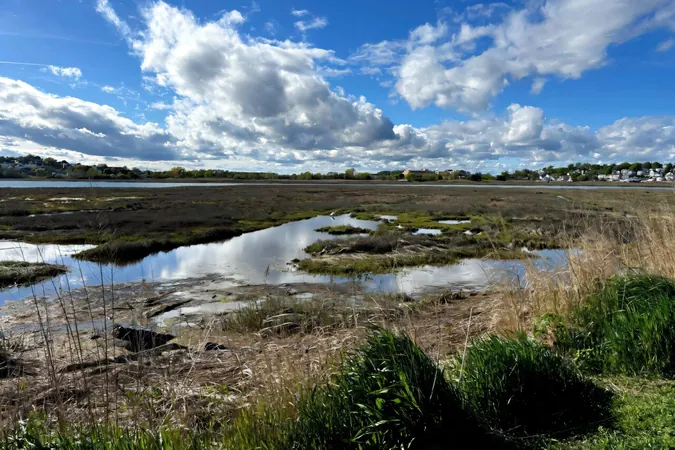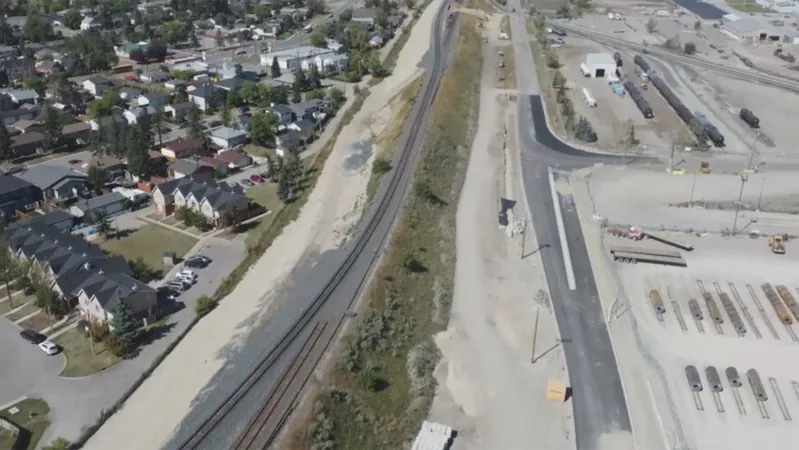
Critical Warning: Global Salt Marshes on the Brink—Act Now to Save Our Coastal Lifelines!
2024-12-17
Author: Emily
Salt Marshes: Coastal Ecosystems at Risk
Salt marshes, vital coastal ecosystems acting as natural buffers against climate change, are currently facing dire threats from rising sea levels and rampant urban development. These wetlands play an essential role in preserving biodiversity, mitigating floods, and providing a plethora of ecosystem services, including carbon storage, recreational fishing, and bird watching, which benefit urban populations significantly.
A Study on New England’s Salt Marshes
A recent study conducted by a dedicated team of researchers from Northeastern University sheds light on the potential future of New England’s salt marshes, focusing particularly on the Belle Isle Marsh Reservation—Boston’s last remaining salt marsh. Published in the Journal of Environmental Management, this research paints a stark picture of the immense challenges that coastal wetlands will face by the year 2100 if we don’t take immediate action.
Call to Action by Researchers
Jahson Alemu I, the lead researcher and a postdoctoral fellow at the Coastal Sustainability Institute, emphasizes that while time is running out, it is still “not too late to act.” He stresses the importance of proactive planning, suggesting strategies such as creating space for marshes to migrate inland as sea levels rise and being cautious about coastal construction to ensure these ecosystems can endure for future generations.
The Importance of Salt Marshes
Salt marshes, characterized by their vibrant grasses and complex root systems, are crucial for keeping coastal areas resilient. The study used advanced modeling to analyze how Belle Isle Marsh's capacity for carbon and nitrogen storage could fluctuate over time, as well as its importance as a habitat for juvenile fish and recreational spaces for local communities.
A Biodiversity Oasis
“The Belle Isle Marsh is a true biodiverse oasis in the urban desert of Boston,” Alemu noted, highlighting how urban areas often lack green spaces and rich wildlife. Randall Hughes, a professor of marine environmental sciences, added that the research conducted here not only has implications for Massachusetts but also offers valuable lessons that can be applied to marsh restoration efforts all along the East Coast and into the Gulf of Mexico.
Grim Predictions for the Future
However, the outlook is grim. The researchers predict a staggering 94% decline in high marsh areas by 2100, with significant ecosystem shifts beginning as early as 2030, and accelerating by mid-century. These changes threaten to replace vital marsh habitats with open water, thereby drastically diminishing vital ecosystem services.
Changes in Marsh Dynamics
As the marsh gradually transforms due to climate-altering factors, not all changes spell doom. Low marsh areas may temporarily expand, offering hope for fish nurseries and nitrogen storage in the short term, but the long-term picture remains bleak. By the century’s end, the extensive loss of habitats could severely curtail the benefits these important ecosystems provide.
Need for Long-Term Planning
Hughes highlights the pressing need for long-term planning, advocating for managed retreat strategies that harmonize urban growth with the preservation of critical marsh areas. Techniques such as sediment addition and buffer zone creation have already shown promise in other regions, and adapting these methods could help mitigate the impending losses facing our coastal wetlands.
Community Engagement in Climate Preparation
Boston’s approach to climate change preparation—centered around community engagement and awareness of the natural ecosystem’s valuable services—could pave the way for smarter investments in restoration projects. Alemu expresses optimism about building a collective conversation to inspire more significant action and investment, ultimately reinforcing community resilience.
Collaboration for a Sustainable Future
This research aligns with ongoing efforts to assess climate vulnerability at Belle Isle Marsh, involving collaboration with local stakeholders to forge pathways toward a sustainable future. The time to act is now; without intervention, we risk losing not just our coastal marshes, but the myriad benefits they provide for generations to come.
Join the Fight!
Join the fight to protect these crucial ecosystems before it’s too late!









 Brasil (PT)
Brasil (PT)
 Canada (EN)
Canada (EN)
 Chile (ES)
Chile (ES)
 España (ES)
España (ES)
 France (FR)
France (FR)
 Hong Kong (EN)
Hong Kong (EN)
 Italia (IT)
Italia (IT)
 日本 (JA)
日本 (JA)
 Magyarország (HU)
Magyarország (HU)
 Norge (NO)
Norge (NO)
 Polska (PL)
Polska (PL)
 Schweiz (DE)
Schweiz (DE)
 Singapore (EN)
Singapore (EN)
 Sverige (SV)
Sverige (SV)
 Suomi (FI)
Suomi (FI)
 Türkiye (TR)
Türkiye (TR)